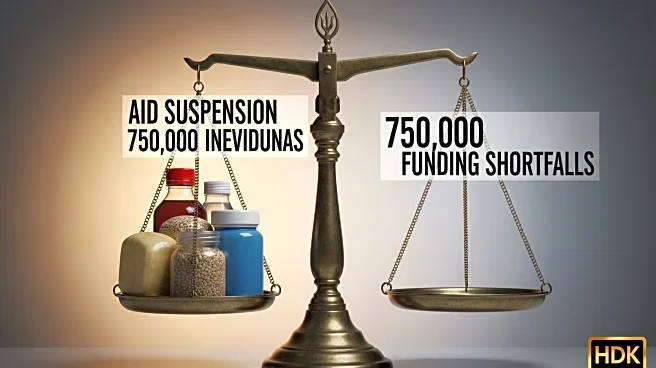What is the story about?
What's Happening?
The United Nations World Food Program (WFP) has announced a significant reduction in food assistance for Somalia, citing critical funding shortfalls. Starting in November, the number of people receiving emergency food aid will drop from 1.1 million to 350,000. This decision comes as Somalia faces severe hunger exacerbated by climate change impacts such as drought and flooding, alongside ongoing conflict and insecurity. The WFP's director of emergency preparedness and response, Ross Smith, highlighted the urgent need for funding to prevent families from being left without support during a critical time. The agency reports that 4.6 million people in Somalia are experiencing crisis levels of hunger, with 1.8 million children projected to suffer from acute malnutrition this year.
Why It's Important?
The reduction in food aid by the WFP is a critical development, as it affects the lives of hundreds of thousands in Somalia, a country already grappling with severe hunger and malnutrition. The situation is further complicated by climate change and conflict, which have destabilized the region. The U.S. foreign aid cuts have compounded the challenges faced by humanitarian agencies, limiting their ability to respond effectively to the growing needs. The WFP's call for $98 million in funding underscores the urgency of sustaining life-saving operations for vulnerable populations through the lean season until March 2026. This situation highlights the broader implications of international funding decisions on humanitarian efforts and the lives of those in crisis.
What's Next?
The World Food Program is actively seeking $98 million in funding to continue its operations and support 800,000 people through the lean season until March 2026. The agency's ability to secure this funding will be crucial in determining the extent of aid it can provide to those in need. Humanitarian agencies may need to explore alternative funding sources or partnerships to address the shortfall. The international community's response, including potential policy shifts or increased contributions, will play a significant role in shaping the future of aid efforts in Somalia.
Beyond the Headlines
The suspension of food aid in Somalia raises ethical questions about the responsibility of the international community in addressing humanitarian crises. It also highlights the long-term impacts of climate change and conflict on vulnerable populations. The situation may prompt discussions on sustainable solutions and the need for comprehensive strategies to tackle the root causes of hunger and instability in the region.


















